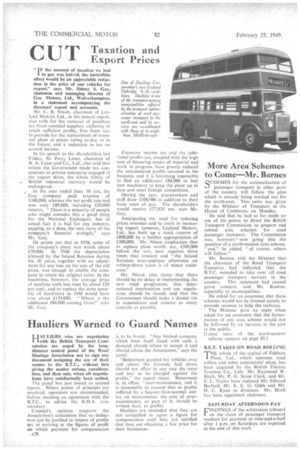CUT Taxation and Export Prices " IF the amou n t of taxationwe had
Page 4

If you've noticed an error in this article please click here to report it so we can fix it.
I to pay was halved, the immediate effect would be an appreciable reduction in the price of our vehicles for export," says Mr. Sidney S. Guy, chairman and managing director of Guy Motors, Ltd., Wolverhampton, in a statement accompanying the directors' report and accounts.
Mr. C. B. Nixon, chairman of Leyland Motors, Ltd., in his annual report, also calls for the removal of purchase tax from essential supplies; authority. to retain sufficient 'profits, free from tax, to provide for the replacement of wornout plant at prices ruling to-day or in the future; and a reduction in tax on earned income.
In his speech to the shareholders last Friday, Sir Percy Lister, chairman of R. A. Lister and Co., Ltd., also said that unless the Government made tax concessions to private enterprise engaged in the export drive, the whole fabric of British industrial recovery would be endangered.
In the year ended June 30 last, the Guy company paid taxation of 1100,000, whereas the net profit retained was only 189,000, including 130,000 reserve. "There is a minority of people who might consider this a good thing for the National Exchequer, but in actual fact it is bad for any industry, sapping, as does, the very roots of the company's financial strength," says Mr. Guy.
He points out that in 1938, some of the company's plant was worth about 170,000. In 1948 the depreciation allowed by the Inland Revenue during the 10 years, together with an adjustment for any loss on the sale of the old plant, was enough to enable the cornpany to retain the original value. In the meantime, however, the average price of machine tools has risen by about 120 per cent., and to replace the same quantity of machinery in 1948 would have cost about £154,000. "Where is the additional 184,000 coming from?" asks Mr. Guy.
Excessive income tax and the additional profits tax, coupled with the high cost of financing stocks of material and work in progress, have greatly reduced the accumulated profits retained in the business, and it is becoming impossible to find an additional 184,000 to buy. new machinery to keep the plant up to date and meet foreign competition.
During the year, pieceworkers and staff drew 1108,986 in addition to their basic rates of pay. The shareholders would receive 127,820 net, says Mr. Gay.
Anticipating the need for reducing. prices overseas and to assist in increasing export turnover, Leyland Motors, Ltd., has built up a stock reserve of /800,000 by a further appropriation of /200,000. Mr. Nixon emphasizes that to replace plant worth, say, -£500,000 before the war, now requires three times that amount and "the Inland Revenue wear-and-tear allowance on written-down value is of minor assistance."
Mr. Nixon also stales that there should be no delay in implementing the new road programme, that international construction and use regulations should be issued, and that the Government should make a drastic cut in expenditure and remove as many controls as possible..




























